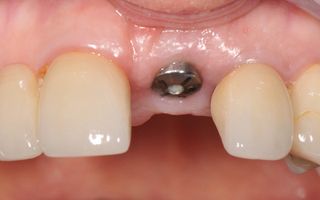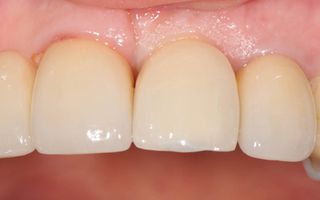
Dental Implants
The best treatment for replacing a single or multiple teeth.
Missing teeth is more than just appearance. Missing teeth can also affect oral health and psychological health when you become self-conscious about how the gap in your teeth looks. Plugging the gap when you have lost one or more teeth can reduce oral and general health issues, and can also improve your self-esteem and confidence.
When you are concerned about these issues and impacts, it’s time to talk with our highly-skilled dentists about dental implants.
Losing teeth
Australians are keeping their teeth longer than ever – thanks to initiatives over recent decades such as water fluoridation and more sophisticated and regular dental care. However, adults still do lose their teeth, which can cause:
- Teeth either side of the missing tooth to move out of position
- Receding jawbone and gum, as well as a loss of facial muscle elasticity
- Misalignment of bite and jaw
- A loss of confidence in smiling due to the gap(s) between teeth.
The following list details the leading causes of tooth loss in modern Australia:
Trauma or injury
No matter how careful we may plan to be, accidents happen. Impact injuries sports, collins, falls or other means can cause tooth loss. Trying the following precautions are terrific ways to make sure your teeth stay intact:
- Wearing mouthguard while playing sports
- Avoiding chewing ice, popcorn or nutshells
- Using tools other than your teeth to remove bottle tops, clothing tags or to cut thread.
If these safeguards don’t work, or aren’t used, a visit to our Richmond dental clinic to discuss dental implants could be on your horizon.

Cavities
Employing solid daily dental care (such as brushing and flossing) is your first line of defence when it comes to reducing your likelihood of getting a cavity. An untreated cavity can destroy the pulp in the centre of a tooth, often resulting in a root canal procedure or even tooth extraction and subsequent replacement with a dental crown or bridge, secured by an implant.
Gum disease
More than 70% of adult tooth loss is due to periodontal disease (gum disease). Gum disease starts with a bacterial infection and can progress to destroying the gum tissues and even the jawbone. When the gum tissue and jawbones are damaged, teeth will lose their support and can fall out.
Other risk factors
The following diseases and risk factors can lead to tooth loss:
- Arthritis
- Diabetes
- Smoking
- Poor nutrition
- High blood pressure (hypertension)
When consulting with one of dentists, please be sure to mention if you live with any of these diseases or risk factors.
Choosing to have dental implants
Choosing to get dental implants can be a big undertaking. Our caring and skilled dentists at Richmond Fine Dentistry will help you make the right choice. We offer some of Melbourne’s most comprehensive dental implant treatments for both single or multiple tooth loss.
Types of cosmetic appliances
Dental implants are developed from medical-grade titanium and are placed in your jawbone to substitute for a missing tooth root. This implant now serves as a solid base to which a cosmetic appliance such as a crown, bridge or denture (full or partial) may be affixed.
Crowns
A crown is made of a porcelain compound and encases an existing, damaged tooth. The crown attaches to the dental implant. Click here for more information.
Bridge
A bridge is made of a porcelain compound and replaces missing teeth. The bridge is attached to the dental implant. Click here for more information.
Dentures
If you need less than three teeth replaced, a dental implant may be the best choice. If more than three teeth need replacing, a denture appliance would be the better choice.
Benefits of dental implants
Having a dental implant will:
- improve your gum and oral health
- eliminate the situation of discernible tooth movement
- develop a renewed self-confidence in your smile.
Dental implants are a long-term solution and can be cleaned as part of your regular teeth-cleaning routine.
The ‘who’, ‘how’ and ‘when’ of dental implant treatments
Having a dental implant means a lot of meticulous planning and preparation. Dental implants at Richmond Fine Dentistry involve the valuable skills of our following dental professionals at each stage of the procedure:

Restorative dentist
We have dentists at our Richmond clinic specialising in – or having a dedicated interest in – restorative dentistry. Restorative dentists excel in returning your damaged or missing teeth to their former glory. Restorative dentists:
- manage the treatment plan
- take initial impressions
- conduct the restorative phase of treatment (the part you see).
Oral surgeon
Our Richmond clinic engages a skilled oral surgeon who will conduct the surgical assessment, surgical placement of the implant fixtures and the surgery’s follow-up. Dr Harper has a solid and long-standing relationship with two oral surgeons who practice in rooms in the CBD and Richmond – these locations are convenient for our clients.
Dental laboratory technicians and ceramists
These professionals manufacture the crown, bridge or dentures, and assess the shade and the aesthetics of the appliance.
Dental implant company
We have a strong relationship with the dental implant company – they provide the implant components (screws, cement etc) and perform technical support as needed. Richmond Fine Dentistry predominantly use Straumann dental implants, global leaders in dental implants.
Pre-treatment care
When you have chosen to go ahead with a dental implant, you will need to have good oral and general health. Your teeth and gums need to be in optimal health before the procedure, so you will need to follow a strict oral health routine for at least 3-4 weeks before any treatment begins.
If you are a smoker, we strongly recommend you cease smoking before the treatment – smoking can make it harder for successful placement of the dental implant into your jawbone. Your smoking status can also mean a longer healing time after treatment. Please speak to our dedicated and caring dental professionals for advice and information about smoking cessation.
We will also thoroughly examine your hard and soft gum tissues. This examination includes taking X-rays and will allow the dentists to determine if there is sufficient bone structure and gum thickness to support a dental implant.
Our dentist will take an impression of the mouth area requiring implant treatment, and send it offsite to our dental laboratory technicians so they can create the crowns.

In the chair
You will receive a local anaesthetic during the procedure, when the oral surgeon will insert the dental implant into your jawbone. You will experience complete comfort and no pain while the highly-skilled oral surgeon performs the implant procedure – this part of the treatment occurs offsite at the oral surgeon’s rooms. Many patients return to their normal daily activities the day after the procedure.
If you are a patient who finds the idea of dental implants quite daunting, the procedure can be performed under sedation, or under general anaesthetic.
After the oral surgeon has inserted the implant, you will receive temporary restoration replacements while the implant osseointegrates (bonds naturally) to the jawbone. The temporary replacement will allow you to retain your mouth function, appearance and full smile.
Post-treatment
You will return to our Richmond clinic once the implant site has healed (usually after about eight weeks) to remove the temporary replacement and have the permanent crown, crowns or bridge secured to the implant.
Dental implant care
It’s essential to care for the implant and permanent crowns – just as it’s very important to care for your natural teeth. Regular brushing twice a day with a soft-bristled toothbrush is paramount, combined with flossing and regular appointments with our dental care team. Our team will examine the restorations and the implants regularly, to ensure the risk of developing peri-implantitis (similar to gum disease) is low.

Dentures vs implants
You can say goodbye to the old-fashioned, unconvincing false teeth your grandparents had. Today’s denture technology creates an appliance that feels as close to natural teeth as possible, allowing patients to resume their regular chewing, eating and speaking functions, as well as supporting facial structures such as lips and cheeks.
Implant-supported dentures
Many of our patients who wear dentures have chosen to have dental implants placed to secure their dentures. With two implants attached to each jawbone, the denture securely attaches to the implants with retention devices called LocatorsTM. These precise devices hold the denture in place to rest gently on the gums, with optimal stability.
Implant-supported dentures no longer rely on an adhesive gel. They significantly improve facial muscle strength and shape, and are enormously comfortable when compared to traditional dentures.
Frequently asked questions
The cost of a dental implant can vary quite dramatically depending on a number of factors, such as if you require more than one implant, the type of dental implant required (for example, All-on-4 dental implants) or even the type of materials used.
During the procedure, you shouldn’t feel any pain as your dentist or oral surgeon will apply anaesthetic. In the days following each procedure you may feel some tenderness or pain, which can be managed with over-the-counter pain medication.
Yes, dental implants are usually a good option for your oral health. Speak to your dentist about whether they would be suitable for you.
As with natural teeth, it's important to properly care for your dental implants to avoid issues. That means thoroughly brushing your teeth and rinsing out your mouth to remove debris and plaque. You'll also want to continue getting regular dental check-ups. If you neglect your dental hygiene after you've received dental implants, plaque and gum infections can occur because they're bonded with the jawbone and gum tissues.
Dental implants are made to last, so technically speaking, they should last a lifetime. Regular check ups and proper care will ensure their longevity. If anything, you may need a new crown after 10-15 years if your existing one begins to wear down or crack.
Your dentist will advise you on whether or not you are a good candidate for dental implants.
Generally speaking, children and teens are too young for implants as their bones are still developing, smokers are advised to quit if they want an implant because the habit can cause bad outcomes with the healing process, and those who don’t take good care of their teeth may also not be good candidates as you will need to look after your oral health for the implant to work.
Additionally, those in advanced age may not be advised to have implants, as they may not heal as well as required.
Each procedure takes anywhere from 30 minutes to 2-3 hours, depending on what’s needed.
Dental implants require minor surgeries, which means there are some risks involved. These include; infection, sinus problems, injury, or nerve damage. Although these are not the norm, it is best to speak to your dentist about the risks involved with your specific case.

